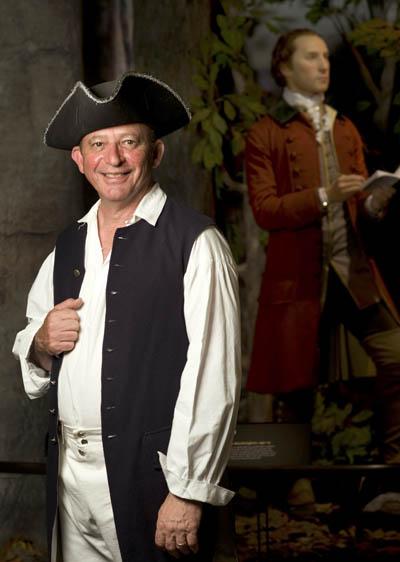Criminal Justice Professor Brings History of U.S. Intelligence to Life
Michael Botta goes undercover to teach the roots of intelligence studies
The Point, Fall 2010
 Michael Botta, assistant professor of criminal justice and intelligence studies, doesn't have a problem pretending he's someone else. When you've worked for three decades as a special agent, going "undercover" comes naturally.
Michael Botta, assistant professor of criminal justice and intelligence studies, doesn't have a problem pretending he's someone else. When you've worked for three decades as a special agent, going "undercover" comes naturally.
Last summer, he offered to give a lecture at the Penn's Colony Festival in Saxonburg, Pa., on spies in the Revolutionary War. When the festival staff offered him a period costume, he said, "Sure."
Since then he's received more requests to give his spy talk, including a recent lecture at the Heinz History Center, part of a celebration of the opening of the Fort Pitt Museum. "With the work I do, you either teach, or you practice," Botta said.
Botta's interest in the Revolutionary War period is a natural outgrowth of his work as a special agent and as a teacher.
"With the advent of the Freedom of Information Act in 1994, a lot of stuff became known about espionage techniques - even dating back to the Revolution," Botta said.
And what about Nathan Hale, the man considered to be the first American spy? Before being executed by the British at the age of 21, he allegedly said, "I only regret that I have but one life to give for my country."
"He wasn't the only spy, and he wasn't a very good one. He should have stayed a school teacher," Botta said with a laugh.
Botta retired from counterterrorism work in 2004 and joined the Department of Criminal Justice and Intelligence studies at Point Park. Since then, the intelligence studies program has grown from four to 70 students. In the future, the University plans to offer internships with the Defense Intelligence Agency where students will get security clearances and perform actual intelligence work.
"Luckily, I was able to team up with Greg Rogers to design Point Park's intelligence program," Botta said. Rogers and Botta were partners when both worked for the U.S. Customs Service. Rogers is now chair of the criminal justice and intelligence studies department.
"Point Park is unique in that we teach trade craft. Most schools teach intelligence analytical work. We teach what it's about, the politics involved, dead drops, secret codes and surveillance," Botta said.
In addition to working for the U.S. Customs Service, Botta worked for the Drug Enforcement Agency, the Internal Revenue Service and Immigration and Customs Enforcement.
"Working for the DEA gives you the same experience as an intelligence agent operative because you're working with people who don't know who you are and you're trying to gain information," Botta said.
Botta uses real-world scenarios in class as much as possible to teach students how to think.
"I tell them to watch all the news media. We call that open-source intelligence. You'll pick up the diversity of information. You'd be surprised how many different versions you can get of a car accident," Botta said.
"At the beginning of every semester, I draw a little box on the blackboard and I put a "u" inside it. I tell my students, 'this is you guys. I'm out here. I think outside the box. By the time you leave me, you'll be thinking outside the box also.'"
Article by Mark Sullivan
Above: Assistant Professor Michael Botta joins George Washington at the Senator John Heinz History Center last May at a celebration of the opening of the Fort Pitt Museum. Photo by Martha Rial.
This article originally appeared in the Fall 2010 issue of The Point, a magazine for alumni and friends of Point Park University.

